Health
Dozens of Children Die Every Year in Hot Cars. Could Technology Save Them?

Ever since Tyler Cestia left his son Thomas in his truck on a hot morning in June two years ago, he has felt, he said, like a cork bobbing in the ocean.
It was June 14, 2021, and Mr. Cestia was preparing for a stressful audit at work when he forgot to drop off Thomas at the babysitter on the way to his office in New Iberia, La.
At lunchtime, he drove to a restaurant with the auditor and then back to his office.
That afternoon, it occurred to him that he didn’t remember seeing the babysitter that morning. He ran to his truck where he found Thomas in his car seat behind the driver’s seat. Thomas, who was 2 and a half years old, was pronounced dead at the scene.
“It was just a total utter shock,” said Mr. Cestia, 37, who lives in New Iberia with his wife, Pam, and their two other children. “It’s almost like a nightmare that’s not real. I’m living in a makeshift world that’s not real. And once you come down off that, it’s a daily grind.”
Mr. Cestia said he has coped with the extreme grief with help from his religious faith and therapy. He has also had the support of his wife.
“People think, ‘Oh, how does somebody do that?’” Pam Cestia said. “You don’t forget your cellphone. You don’t forget this. But he was hyper-focused on something else. He’s not a bad parent. He’s not a bad father.”
The aftermath in other cases has been more dire. Marriages have fallen apart. Caregivers have been prosecuted and faced prison time. In one case last year in Chesterfield, Va., a father who realized what he had done immediately went home and killed himself.
And still the deaths come. Just this week in Houston, a 3-month-old died after he was left unattended in a car, the police said. About 40 children a year die from heatstroke in cars, either because they are left in the vehicle or because they become trapped, according to the National Highway Traffic Safety Administration.
That averages out to a child dying in a hot car every 10 days in the United States. The deaths are more frequent in summer but happen in every month of the year.
Child-safety advocates said that new technology could help prevent these recurring tragedies. Vehicles with interior motion sensors, for example, can sound the horn and send alerts to a driver’s phone if they detect a child in the back seat after the car has been turned off.
But automakers and regulators have not made the technology standard equipment in new vehicles, frustrating safety experts. According to Kids and Car Safety, a nonprofit group, 1,050 children have died in hot cars nationwide since 1990 and at least another 7,300 have survived with varying injuries.
“It should really be embarrassing for the automakers and to the government that this has not already been taken care of,” said Janette E. Fennell, the founder and president of Kids and Car Safety. “When you have the technology to prevent these deaths, and it’s not expensive, what are we waiting for?”
Federal regulators said they were developing rules that would require new vehicles to have lights and chimes to remind drivers to check the back seat after they turn off a car, as required under the $1 trillion infrastructure law that President Biden signed in 2021. But that requirement won’t take effect until 2025.
Major automakers have also pledged that by 2025 all new vehicles will include basic back-seat reminder systems. As of last October, more than 150 models offered the reminders, according to the Alliance for Automotive Innovation, which said in a statement that the industry was making “major progress” toward its goal of universal back-seat reminders.
But higher-tech systems that use radar or ultrasonic sensors to detect a child in the back seat remain relatively rare.
“It’s a matter of cost and demand,” said Emily A. Thomas, the manager of auto safety at Consumer Reports, which holds the position that child-detection systems should be standard in new vehicles. “People don’t know this is what they need, so there’s not a huge demand for it and, unfortunately, the auto industry responds to what’s required. So if it’s not required, they won’t put it in as standard equipment.”
About half of all hot-car deaths lead to criminal charges ranging from child endangerment to murder, according to Kids and Car Safety. Many parents and caregivers take plea deals to avoid jail time and because they are unwilling to face a court battle after the death of a child, the group said.
The psychological underpinnings of the problem have been discussed for years, at least since 2009, when Gene Weingarten of The Washington Post wrote a Pulitzer Prize-winning article exploring whether criminal charges are really appropriate for parents who accidentally kill their children by leaving them in cars.
David M. Diamond, a neuroscientist at the University of South Florida who was quoted in that story, has been patiently explaining the issue ever since, including for a documentary film, “Fatal Distraction,” that was released in 2021.
Dr. Diamond said that many of the deaths happen when parents drive to work and go into “autopilot mode and lose awareness of the child in the back seat.”
During the drive, the part of the brain that handles habitual behaviors like commuting “outcompetes and suppresses” the conscious memory system, which is responsible for reminding a parent to stop and drop off the child at day care, Dr. Diamond said. Stressed and sleep-deprived parents are particularly susceptible to this problem, he said.
“That’s why we need technology because, frankly, we are so forgetful,” Dr. Diamond said in an interview. “I try to emphasize to people that it’s not negligence, it’s not bad parenting, it’s just part of being human.”
The reminder lights and chimes installed in many newer vehicles advise drivers to check the back seat when the car is turned off. Those systems are usually triggered by a rear door being opened before or during a trip, but they cannot actually detect whether a child is in the car.
Ultrasonic sensors, found in some Kia and Hyundai vehicles, can detect a child (or a pet) moving in the back seat after a vehicle has been locked and then blow the horn and send text messages to the driver. But ultrasonic sensors may not detect a child sleeping in a rear-facing car seat, Dr. Thomas said.
Radar-based systems can purportedly detect even slight movements like the rise and fall of the chest of a child sleeping in a car seat. At least one vehicle, the Genesis GV70, features that technology.
In March, the Federal Communications Commission approved a specific frequency for short-range radar, which automakers say will make it much easier to deploy child-detecting radar inside cars. Before that, companies had to seek waivers from the F.C.C.
While radar technology is not widely available, safety advocates said that drivers could remind themselves to check the back seat by putting something important next to the child, like a purse, phone, wallet or even one of their shoes.
The Cestias have their own system. Every morning at 8:05 they text each other to make sure that their 1½-year-old was dropped off at the babysitter.
They have also spoken out strongly in favor of mandatory child-detection technology in cars.
“This is my opportunity to be Thomas’s mom and to advocate for him,” Pam Cestia said. “His story can help save other people’s lives.”

Health
Drinking alcohol is linked to six types of cancer, experts say: ‘It’s toxic’
It’s long been known that no amount of alcohol is good for the body — and now new research spotlights the potential harm it can cause.
More than 5% of all cancer cases are caused by drinking alcohol, according to the Cancer Progress Report 2024 from the American Association for Cancer Research (AACR).
Among the modifiable risk factors for cancer, alcohol is the third biggest, behind obesity (7.6% of cases) and cigarette smoking (19.3%).
TO REDUCE CANCER RISK, SKIP THE ALCOHOL, REPORT SUGGESTS
“Excessive levels of alcohol consumption increase the risk for six different types of cancer, including certain types of head and neck cancer, esophageal squamous cell carcinoma, and breast, colorectal, liver and stomach cancers,” said Rajarshi Sengupta, PhD, lead author of the AACR Cancer Progress Report 2024, in a statement sent to Fox News Digital.
More than 5% of all cancer cases are caused by drinking alcohol, according to the Cancer Progress Report 2024 from the American Association for Cancer Research. (iStock)
“Further, research shows that alcohol intake at an early age can increase the risk of cancer later in life.”
Based on these findings, limiting or eliminating alcohol can reduce the risk of developing alcohol-related cancers by 8% and the risk of all cancers by 4%, the report noted.
Addiction expert warns of risks
There has been a “roller coaster of information” about whether alcohol is harmful, according to addiction psychiatrist Dr. Adam Scioli of Caron Treatment Centers in Pennsylvania.
“There have even been reports for years that it could be beneficial for one’s health — but we know now that alcohol ingestion is one of the modifiable risk factors for cancer,” Scioli, who is not affiliated with AACR, told Fox News Digital.
‘DOES SMARTPHONE EXPOSURE CAUSE BRAIN CANCER?’: ASK A DOCTOR
Around 75,000 Americans each year are diagnosed with a cancer that is linked in some way to alcohol use, according to Scioli.
The more someone drinks — both in volume and frequency — the higher the risk, he warned.
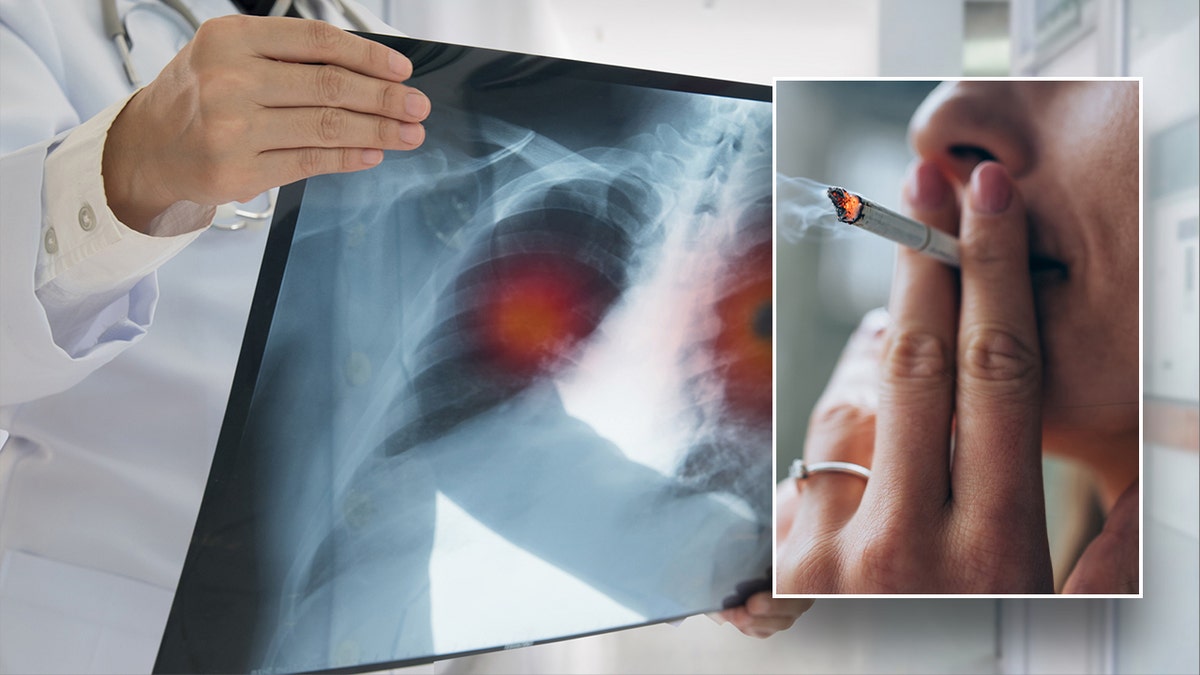
Among the modifiable risk factors for cancer, alcohol is the third biggest, behind obesity (7.6% of cases) and cigarette smoking (19.3%). (iStock)
“Alcohol is a toxin,” Scioli said.
“We’ve long known that it impacts any number of organs, essentially starting with the brain and working its way down to the colorectal system.”
Is there a ‘safe’ amount?
Moderate alcohol use is defined as one drink or less in one day for women.
For men, it is two drinks or fewer per day, according to the Centers for Disease Control and Prevention (CDC).
“We’ve long known that alcohol impacts any number of organs, starting with the brain and working its way down to the colorectal system.”
“Drinking alcohol in moderation may increase your overall risks of death and chronic disease,” the agency stated on its website.
“Even low levels of alcohol use (less than one drink per day) can raise the risk of certain cancers.”
Scioli agreed, emphasizing that “we can definitely say there’s no added health benefit to ingestion of alcohol.”
“The line between safety and danger is debatable, and is different for each person.”
While risk factors like tobacco use are widely known, public awareness about the link between alcohol and cancer is still low, according to Sengupta.

Moderate alcohol use is defined as one drink or less in one day for women, and two drinks or fewer for men, per the CDC. (iStock)
Most Americans (51%) are not aware that alcohol increases cancer risk, per AACR data.
“It’s been flying under the radar for far too long — especially given the number of Americans who have met the criteria for alcohol use disorder, which is around 29 million Americans in 2023,” said Scioli.
What needs to change?
The good news, according to Scioli, is that with modifiable risk factors like alcohol, reducing the intake decreases the risk.
CLICK HERE TO SIGN UP FOR OUR HEALTH NEWSLETTER
As the report stated, those who are successful in decreasing their drinking or abstaining below those moderate risk levels will see a risk reduction in overall cancers, he noted.
Around 75,000 Americans each year are diagnosed with a cancer that is linked in some way to alcohol use, an expert said. (iStock)
“We need to do a much better job of making the public aware of the risks inherent in drinking — particularly moderate to heavy drinking,” Scioli said.
“And we need to make the public aware that there are mechanisms by which they can access help if they are unable to moderate their drinking or quit on their own.”
For more Health articles, visit www.foxnews.com/health
To help raise awareness, Sengupta of the AACR called for public messaging campaigns, “such as cancer-specific warning labels displayed on alcoholic beverages.”
Along with that, she told Fox News Digital, “effective clinical strategies that reduce or eliminate alcohol consumption must be considered to reduce the burden of alcohol-related cancers.”
Health
Intermittent Fasting + Walking: The Science-Backed Combo That Helped This Grandma Lose 3X the Weight

Sign Up
Create a free account to access exclusive content, play games, solve puzzles, test your pop-culture knowledge and receive special offers.
Already have an account? Login
Use left and right arrow keys to navigate between menu items.
Use escape to exit the menu.
Health
New schizophrenia drug gets FDA approval, taking novel approach to treating brain disorder
A new drug has been approved for the treatment of schizophrenia in adults.
On Thursday, the U.S. Food and Drug Administration (FDA) approved COBENFY (xanomeline and trospium chloride), an oral medication that is manufactured by Bristol Myers Squibb in New Jersey.
This marks the first new class of medications for the brain disorder in several decades, according to a press release.
5 MYTHS ABOUT SCHIZOPHRENIA, ACCORDING TO A MENTAL HEALTH EXPERT: ‘HUGE STIGMA’
COBENFY is expected to be available in the U.S. in late October, the company noted.
A new drug has been approved for the treatment of schizophrenia in adults. (iStock)
“Today’s landmark approval of our first-in-class treatment for schizophrenia marks an important milestone for the community, where after more than 30 years, there is now an entirely new pharmacological approach for schizophrenia — one that has the potential to change the treatment paradigm,” said Chris Boerner, PhD, board chair and chief executive officer at Bristol Myers Squibb, in the press release.
STUDY REVEALS HEAVY MARIJUANA USE IS LINKED TO SCHIZOPHRENIA
Schizophrenia is a serious mental illness that affects a person’s thoughts, feelings and behaviors.
It often causes hallucinations, delusions, disordered speech and loss of touch with reality, Mayo Clinic states on its website.

COBENFY (xanomeline and trospium chloride) is an oral medication that is manufactured by Bristol Myers Squibb in New Jersey. (Bristol Myers Squibb)
The disorder can also lead to lack of emotional expression, lack of motivation, cognitive dysfunction and social withdrawal.
Approximately 2.8 million people in the U.S. and 24 million people globally are living with schizophrenia.
AI-DISCOVERED DRUG SHOWS ‘ENORMOUS POTENTIAL’ TO TREAT SCHIZOPHRENIA: ‘REAL NEED FOR BETTER TREATMENT’
The disorder has traditionally been treated with antipsychotic medications, but around 40% of patients do not respond to treatments and 60% experience “inadequate improvement” in symptoms or “intolerable side effects,” studies have shown.

COBENFY is expected to be available in the U.S. in late October, the company noted. (Bristol Myers Squibb)
COBENFY works differently than the currently available schizophrenia medications.
“Due to its heterogeneous nature, schizophrenia is not a one-size-fits-all condition, and people often find themselves in a cycle of discontinuing and switching therapies,” said Rishi Kakar, MD, chief scientific officer and medical director at Segal Trials and investigator in the drug’s clinical trials, in the release.
“Schizophrenia is not a one-size-fits-all condition, and people often find themselves in a cycle of discontinuing and switching therapies.”
“The approval of COBENFY is a transformative moment in the treatment of schizophrenia because, historically, medicines approved to treat schizophrenia have relied on the same primary pathways in the brain.”
“By leveraging a novel pathway, COBENFY offers a new option to manage this challenging condition.”

“Today’s landmark approval of our first-in-class treatment for schizophrenia marks an important milestone for the community,” said Chris Boerner, PhD, board chair and chief executive officer at Bristol Myers Squibb. (iStock)
Sam Clark, founder and CEO at Terran Biosciences — a biotech company that develops treatments and technologies for neurological and psychiatric diseases in New York City — commented on the new approval in a statement sent to Fox News Digital.
“I am excited that the FDA has just approved [COBENFY] as a treatment for patients with schizophrenia, marking a big leap forward in the psychiatry space,” he said.
“These patients live with a difficult disease, and this drug with a novel mechanism of action will surely make a significant impact,” Clark continued.
“We look forward to seeing the renaissance continue as this approval paves the way for future breakthroughs and novel patient-focused therapeutics.”
CLICK HERE TO SIGN UP FOR OUR HEALTH NEWSLETTER
The approval follows three phases of clinical trials in which COBENFY was shown to result in a “statistically significant improvement in illness.”
Schizophrenia is a serious mental illness that affects a person’s thoughts, feelings and behaviors and often causes hallucinations and delusions. (iStock)
In terms of safety, the medication’s most common side effects during clinical trials were nausea, indigestion, vomiting, diarrhea, constipation, hypertension, abdominal pain, accelerated heart rate, dizziness and gastroesophageal reflux disease, the release stated.
Patients with certain existing medical conditions may experience other, more serious risks.
For more Health articles, visit www.foxnews.com/health
People should discuss potential complications with a doctor before starting the medication.
Fox News Digital reached out to Bristol Myers Squibb and the Schizophrenia & Psychosis Action Alliance requesting comment.
-

 News1 week ago
News1 week agoToplines: September 2024 Inquirer/Times/Siena Poll of Pennsylvania Registered Voters
-

 Business1 week ago
Business1 week agoVideo: Federal Reserve Cuts Interest Rates for the First Time in Four Years
-

 News7 days ago
News7 days agoVideo: Who Are the Black Swing Voters?
-

 Politics1 week ago
Politics1 week agoDem lawmakers push bill to restore funding to UN agency with alleged ties to Hamas: 'So necessary'
-

 Politics1 week ago
Politics1 week ago'I've never seen this': Top Republican details level of Secret Service 'lack of cooperation'
-

 News1 week ago
News1 week agoElection 2024 Polls: Florida
-

 World1 week ago
World1 week agoCritics slam landmark EU competitiveness report as 'one-sided'
-

 Finance1 week ago
Finance1 week agoThis ETF uses ChatGPT to invest like Warren Buffett
















